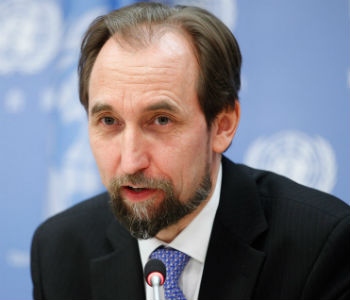 The United Nations human rights chief on Wednesday denounced “flagrant irregularities in the trial of former Maldives president Mohamed Nasheed, who last week was sentenced to 13 years in prison.
The United Nations human rights chief on Wednesday denounced “flagrant irregularities in the trial of former Maldives president Mohamed Nasheed, who last week was sentenced to 13 years in prison.
UN High Commissioner for Human Rights Zeid Ra’ad Al Hussein said the sentence followed “a rushed process that appears to contravene the Maldives’ own laws and practices and international fair trial standards in a number of respects.”
Nasheed, the Indian Ocean archipelago’s first democratically elected leader, was convicted late on Friday under the country’s tough anti-terror law of ordering the arrest of a chief judge when he was president in January 2012.
Zeid pointed out that the 47-year-old’s trial had begun just one day after his arrest on new charges under the anti-terror law, after the country’s top prosecutor had withdrawn the original charges against him.
He hinted that the speedy trial could breach the country’s own constitution, which requires defendants to be given adequate time to prepare their defence.
“Former president Nasheed was without counsel at his remand hearing. His legal team later recused itself after the sixth hearing, but the court did not wait until he had new counsel before proceeding with the trial,” Zeid said.
And, he added, “the fact that judges in the case, as well as the Prosecutor-General, have also been witnesses in the investigation must raise serious questions about conflict of interest.”
The verdict came amid growing opposition to the government of President Abdulla Yameen and will effectively prevent Nasheed from running for president at the 2018 elections.
The opposition has held regular night-time rallies over the past year to protest what they call growing authoritarianism, which has damaged the atoll nation’s image as a tourist paradise.
While saying “no one should be above the law,” Zeid stressed that “in a polarised context, and given the long-standing serious concerns about the independence and politicistion of the judiciary in the Maldives, this case should have been handled with much greater care and transparency.”
Instead, the courts had refused requests by observers to monitor the trial, he pointed out.
“The Nasheed case places the Maldives’ judicial processes in a sharp spotlight,” Zeid said, voicing hope though that “the flagrant irregularities in this case can still be rectified in the appeal process.
The UN rights chief urged Maldives’ authorities “to restore domestic and international confidence in the legal system by enabling international jurists to observe the appeal process.”



